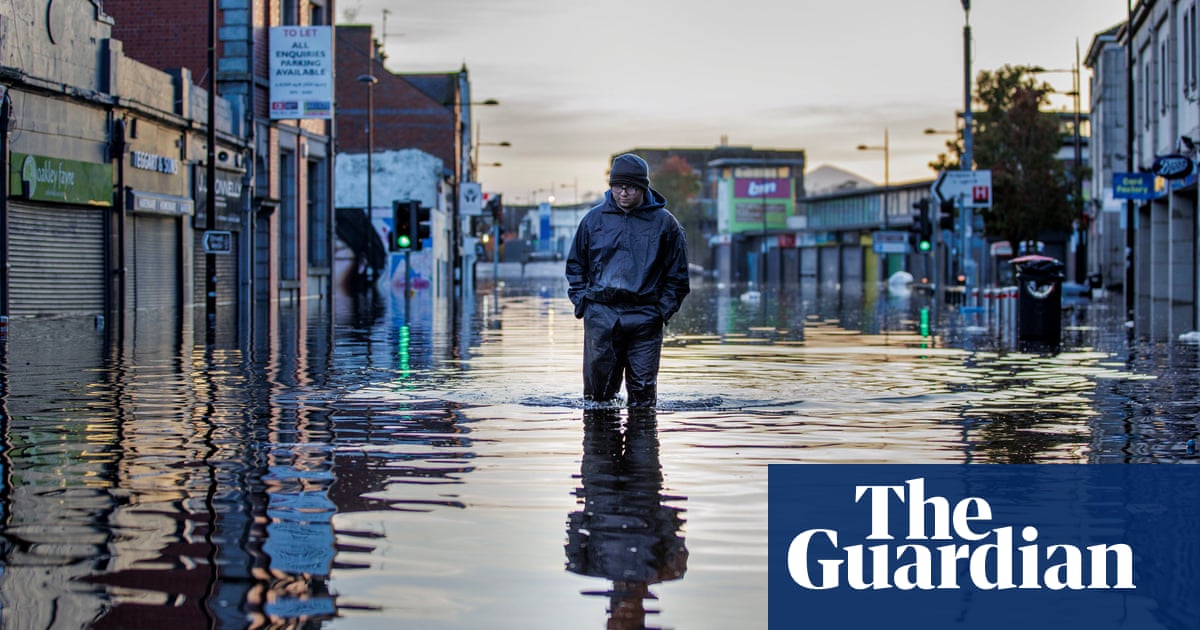‘Never-ending’ UK rain made 10 times more likely by climate crisis, study says

The seemingly “never-ending” rain last autumn and winter in the UK and Ireland was made 10 times more likely and 20% wetter by human-caused global heating, a study has found.
More than a dozen storms battered the region in quick succession between October and March, which was the second-wettest such period in nearly two centuries of records. The downpour led to severe floods, at least 20 deaths, severe damage to homes and infrastructure, power blackouts, travel cancellations, and heavy losses of crops and livestock.
The level of rain caused by the storms would have occurred just once in 50 years without the climate crisis, but is now expected every five years owing to 1.2C of global heating reached in recent years. If fossil fuel burning is not rapidly cut and the global temperature reaches 2C in the next decade or two, such severe wet weather would occur every three years on average, the analysis showed.
The experts behind the study warned that work to protect the populations of the UK and Ireland was still “sorely lacking” and poor and vulnerable people were hardest hit. For example, dehumidifiers provided to dry out flooded homes were not used by some because of high energy costs, while others could not afford to replace losses of frozen food after storms cut power supplies.
The analysis, conducted by climate scientists working as part of the World Weather Attribution group, compared how likely and how intense the wet winter was in today’s heated world with how likely it would have been in a world without high levels of carbon emissions. Warmer air can hold more water vapour and therefore produce more rain. Hundreds of “attribution studies” have shown how global heating is already supercharging extreme weather such as heatwaves, wildfires, droughts and storms across the world.
“The seemingly never-ending rainfall this autumn and winter across the UK and Ireland had notable impacts,” said Dr Mark McCarthy, a climate scientist at the UK Met Office and part of the WWA team. “In the future we can expect further increases – that’s why it is so important for us to adapt to our changing climate and become more resilient.”
Dr Sarah Kew, a researcher at the Royal Netherlands Meteorological Institute and also part of the WWA team, said: “The UK and Ireland face a wetter, damper and mouldier future due to climate change. Until the world reduces emissions to net zero, the climate will continue to warm, and rainfall in the UK and Ireland will continue to get heavier.”
The study included storms Babet, Ciarán, Henk and Isha, which were among the most damaging. A separate analysis from the Energy and Climate Intelligence Unit found that the losses of arable crops alone in the UK due to the heavy rain would cost farmers about £1.2bn, compared with average production over the last decade. Further losses would be suffered by vegetable growers.
Dr Ellie Murtagh, the UK climate adaptation lead at the British Red Cross, said: “We know flooding has a devastating impact on people’s lives. Its effects can be felt for months and years afterwards.”
She said the storms and flooding had caused weather-related home insurance claims in the UK to rise by over a third, reaching a record-breaking £573m worth of claims. One in seven people do not have insurance, with many saying they are unable to afford it.
after newsletter promotion
UK ministers have been criticised for years over the failure to make adequate plans to protect people against the impacts of global heating. In July, the government’s most recent climate adaptation plan was condemned as “very weak” by experts.
“The level of implementation of adaptation interventions is still sorely lacking,” said Murtagh. “Independent assessments in both the UK and Ireland have highlighted the lack of progress.”
Dr Friederike Otto, a climate scientist at Imperial College London and co-founder of WWA, said: “To put it bluntly, climate change is already making life shittier. Wetter winters are flooding farms, cancelling football matches, overflowing sewage systems and [making] groceries more expensive.
“Thankfully, we know the solutions. Replace oil, gas and coal with cleaner, cheaper renewable sources of energy; insulate homes, and restore nature. All this will make life cheaper and better for all, not more expensive.”
Related
Newspaper headlines: ‘Putin’s dirty work in UK’ and ‘Honeytrap spies’
The Times focuses, external on Donald Trump's latest comments about the war in Ukraine. Its headline quotes the US president, who said Vladimir Putin was "doing
‘This could end in World War Three,’ warns Trump as…
7 March 2025, 17:31 | Updated: 7 March 2025, 18:06 'This could end in Worl
Met Office ‘polar vortex’ update as temperatures to plummet
The weather is expected to quickly change after a spell of sunshineThe Met Office has warned that "colder weather is on the way."(Image: Liverpool ECHO)It is fo
British Pie Awards 2025: Naan better as kebab pie wins…
The Turkish-tinged creation by Boghall Butchers - which is celebrating its 50th year in business - won through in the newly-formed fusion category, which also f













